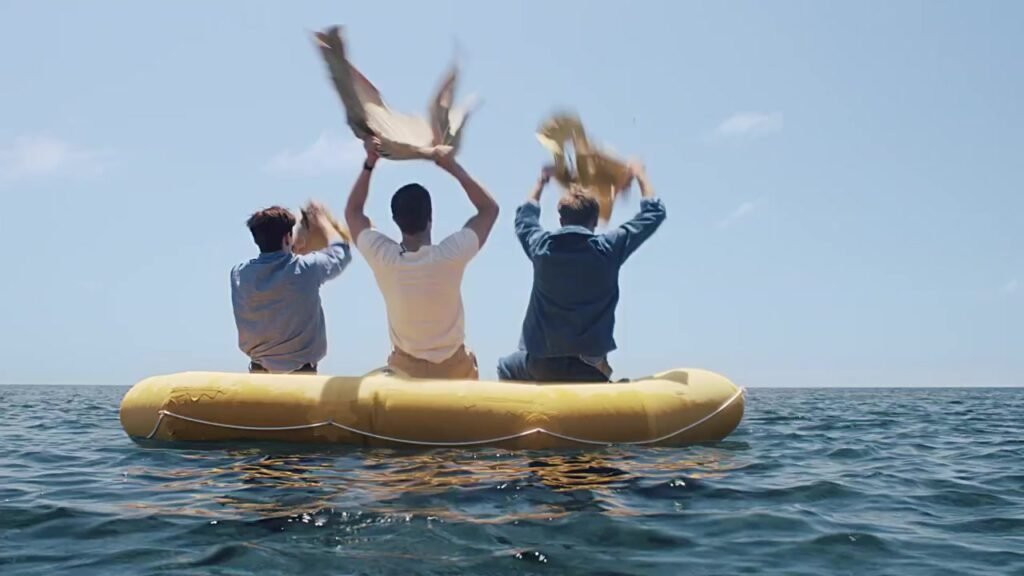
Against the Sun
“Against the Sun” is a film from The American Film Company that tells the real story of an air crew who were in a life raft after their plane crashed in the Pacific during World War II. It was January 1942; they were presumed “missing at sea” after only a cursory “box search.” Pilot Harold Dixon (Garret Dillahunt), bombardier Tony Pastula (Tom Felton) and radioman Gene Aldrich (Jake Abel) had no food, no flares, no water, no supplies all of it had gone down with the plane.
Such stories have universal appeal, perhaps because they create a horrified sense of empathy and worry: What would I do? How would I fare? “Touching the Void,” “All Is Lost,” “Lifeboat” pick your genre these stories often test how far human beings will go to survive and what kind of problem solving stamina is required. Often it’s just wanting to make it out that makes the difference. You can read about this stuff forever: Alfred Lansing’s “Endurance,” Jon Krakauer’s “Into Thin Air,” Piers Paul Read’s “Alive: The Story of the Andes Survivors.”
There are three actors in this film and they’re literally on top of each other for most of it giving strong, no-frills performances. There is also only one setting for most of the film a life raft in the middle of an ocean so director Brian Falk worked well with cinematographer Petr Cikhart to keep things visually interesting. Sometimes you’re looking up at actors’ limbs pig-piled on top of each other in close quarters inside the raft; sometimes you’re looking down at them from above as they lean over opposite sides to paddle, or take turns catching fish between their teeth.
It’s hard to get more elemental than this. They’re starving and so thirsty that every time Tony (the Malfoy ex-pat) sees a fish jump out of the water, he lurches forward and tries to bite it in midair. They keelhaul themselves on the raft’s canopy to scrape barnacles and eat them, like oysters. Harold cuts open a seagull with his penknife and butchers it while Gene holds its wings and legs apart for him, as though they were in a kitchen preparing chicken.
But that’s the fun stuff. How do we make hooks? How do we gather water? What about sunburn? Which way are we drifting, how far?
In “Unbroken,” Laura Hillenbrand writes about Louis Zamperini and the other men in his raft discussing food back home in such detail recipes, preparation that you’d think they were already at a Thanksgiving table with their favorite dishes laid out before them. It wasn’t just to stave off hunger; it was to stay sharp.
So our heroes here pantomime pouring each other hot cups of coffee and talk about what foods they can’t wait to eat again when they get home.
The characters in “Against the Sun” say things like, “Maybe if I could get one of these magazines open we could use the springs as a hook!” That’s over writing. The power of “All is Lost” was that the character was alone. He had to troubleshoot by himself in a tense silence. It was all action and thought. But there are nice touches, small unexpected details like the three men introducing themselves to one another once they clamber into the life raft after the crash. They shake hands as though they are at a dinner party.
Or when Aldrich suggests they pray together. The other two aren’t sure, one isn’t the praying type, the other only knows prayers in Polish. But they do pray, Pastula finishing it up with, “Dear God, I’ll go along with what the other guys said, but mostly we need some rain, dear Lord.” There’s a realistic feel to moments like that, a practical and humorous edge.
There are a couple of hallucinatory sequences that don’t quite work, and Paul Mills’ score comes swooping in, insisting upon being inspirational in a way that feels like unnecessary underlining. You don’t need the score to be inspired by these guys’ gritty will to survive.
Watch Against the Sun For Free On Gomovies.
.jpg?w=1024&resize=1024,1024&ssl=1)
.jpg?w=1024&resize=1024,1024&ssl=1)
.jpg?w=1024&resize=1024,1024&ssl=1)
.jpg?w=1024&resize=1024,1024&ssl=1)
.webp?w=1024&resize=1024,1024&ssl=1)
.jpg?w=1024&resize=1024,1024&ssl=1)
.jpg?w=1024&resize=1024,1024&ssl=1)
.jpg?w=1024&resize=1024,1024&ssl=1)